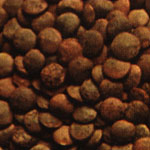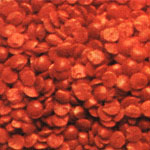


Lentils are an odd lot. They don't fit in with either the beans or the
peas and occupy a place by themselves. Their shape is different from the
other legumes being roundish little discs with colors ranging from muddy
brown, to green to a rather bright orangish-red. They cook very quickly
compared to other beans and have a distinctive flavor. They are much used
in Far Eastern cuisine from India to China.
Lentils, the small round seeds of a pea-like plant, have been cultivated
since the earliest days of settled farming. Almost 8,000 years ago in the
rich fertile area between the rivers Tigris and Euphrates, in what is now
Iraq and Syria, the Sumerians were growing lentils, beans and chickpeas
along with cereals such as wheat and vegetables including onions, leeks
and lettuce.
Lentils were an important component of the expanding Mediterranean agriculture,
providing a major source of protein in the region, particularly for poorer
people. The Hebrew word for lentils, adashim, comes from adeesh meaning
'to tend a flock' - indicating perhaps that it was food for peasants and
herders.
In Europe, from the 11th century onwards, a common food was dumplings cooked
in the cauldron, and often they were made from dried legumes: pease pudding
is an example. Elsewhere, in India for instance, lentils were widely cultivated
nearly 2,000 years ago, along with peas, beans gourds. Early curries contained
many of the distinctive ingredients still today such as onions, lentils
or dal cooked in ghee (clarified butter) and flavored with cardamom, cumin,
coriander and turmeric.
The split red lentils found in every supermarket are just one of
a colorful range of this branch of the leguminosae family. These from the
Egyptian or Syrian brown lentils have been split and hulled. As split red
lentils, they need no soaking, are quick to cook and mash into a congenial
thick soupy consistency when ready. Then there are the large European and
the grey Puy variety take a little longer to cook but retain their shape.
Lentils are one of the most tasty and nutritious pulses. With their protein
content they are important meat substitutes in many peasant communities,
and among other people wishing to omit animal flesh from their diet.
Lentils / Green Lentils / Red Lentils


